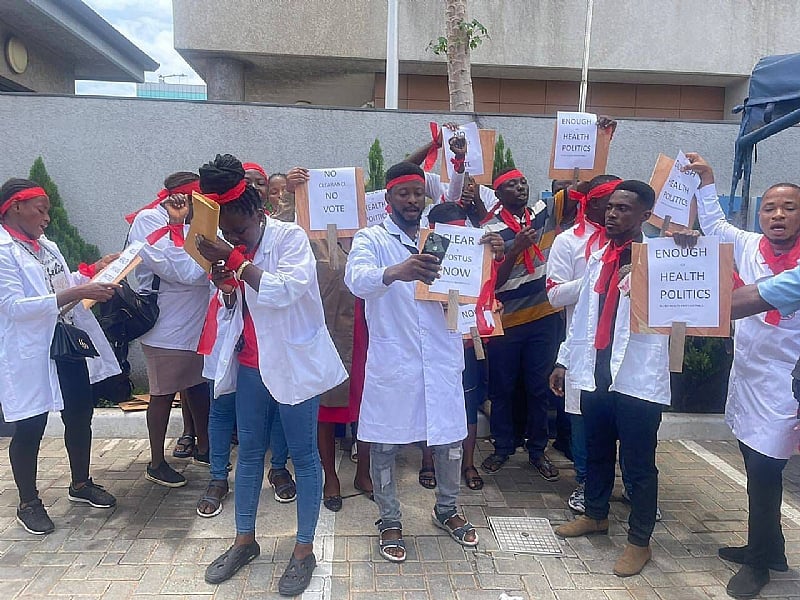The coalition of unemployed allied health professionals, numbering approximately 3,000 individuals, has publicly denounced the alleged discriminatory practices of authorities responsible for postings within the healthcare system. Their central grievance revolves around the stark contrast in treatment between themselves and other healthcare professionals. While other disciplines enjoy automatic postings upon completion of their training, allied health professionals face protracted periods of unemployment, some remaining jobless since 2019. This disparity, they argue, not only constitutes unfair treatment but also poses a significant threat to public health and national stability, given the vital roles they play in the healthcare ecosystem. The coalition voiced their concerns during a press conference held in Accra on May 26, emphasizing the urgency of their situation and the need for immediate action.
The coalition’s accusations of systematic discrimination highlight the inequities within the health sector’s recruitment processes. They contend that while other health professionals seamlessly transition from internship to employment, allied health professionals are subjected to a cycle of disregard, delays, and neglect. This differential treatment, they argue, undermines their professional contributions and creates a two-tiered system within the healthcare workforce. Their demands for equal recognition and opportunity reflect their commitment to their chosen professions and their belief in their crucial role in delivering quality healthcare services. The coalition emphasizes that their skills and expertise are essential for a robust and effective health system, and their continued unemployment represents a missed opportunity to bolster the nation’s healthcare capacity.
The coalition’s concerns gain further significance given the backdrop of chronic staff shortages plaguing key areas within the Ghanaian healthcare system. Diagnostics, disease surveillance, rehabilitation, and health information management are all experiencing critical workforce deficits, hindering the effective delivery of healthcare services. The coalition argues that their unemployment exacerbates these shortages, impacting the quality and accessibility of care for the population. By remaining unemployed, these skilled professionals are unable to contribute their expertise to address these critical gaps, potentially leading to adverse health outcomes for patients. Their call for immediate action underscores the urgency of addressing this workforce crisis and maximizing the available human resources within the health sector.
The coalition’s demands encompass a range of measures aimed at resolving the employment impasse and preventing future occurrences of such discriminatory practices. They are calling for immediate financial clearance and recruitment, effectively ending their period of unemployment and integrating them into the healthcare workforce. Furthermore, they demand an end to bureaucratic delays that have prolonged their joblessness and contributed to their frustration. The coalition emphasizes the need for clear timelines and transparency from both the Ministries of Health and Finance, ensuring accountability and providing a clear roadmap for their integration into the healthcare system. These demands reflect their desire for a fair and efficient recruitment process that values their contributions and recognizes their professional standing.
Beyond their immediate employment needs, the coalition advocates for broader systemic changes to ensure equitable treatment for all healthcare professionals. They are calling for the development and implementation of a national health workforce policy that addresses the specific needs and challenges faced by allied health professionals. Such a policy would provide a framework for standardized recruitment processes, career development pathways, and appropriate compensation structures, ensuring fair and equitable treatment across all health professions. By advocating for such a policy, the coalition aims to prevent future instances of discrimination and create a more inclusive and equitable healthcare workforce.
The coalition’s plight underscores the critical need for comprehensive reforms within the Ghanaian healthcare system. Their experience exposes the systemic challenges related to recruitment, deployment, and recognition of allied health professionals. Addressing these challenges requires a multi-faceted approach involving policy changes, improved communication, and enhanced transparency within the relevant ministries. Failing to address these issues not only perpetuates the injustice faced by these unemployed professionals but also undermines the overall effectiveness of the healthcare system. The government’s response to the coalition’s demands will serve as a crucial indicator of its commitment to building a robust, equitable, and sustainable healthcare workforce for the benefit of all Ghanaians.














